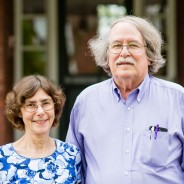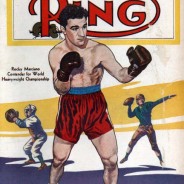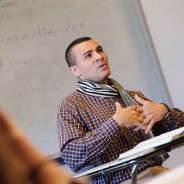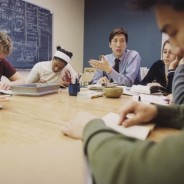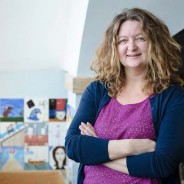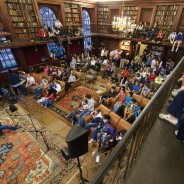Visiting Jordan With Students, Connecting, Not Just Observing
Master of the wry understatement, Joshua Emmott (history department) notes that trying to understand people and the way they live and think is a real advantage as you try to learn history. An inveterate traveler himself, Joshua has taken students to India over one March break in the past, and to Egypt during another. This year, Joshua, who teaches History of the Middle East and Globalization and Islam, among other courses, inaugurates a trip to Jordan. Eight students are joining him and will do far more than visit the sights. “If you...
read moreFrom Fifty to One: We’ll Take It a Day at a Time
After 42 years at Milton—24 of those years living in Robbins House—lots of adjustments loom ahead. One of these adjustments may not occur to most people as they think about retiring: Erica and I are going from living our everyday lives with at least fifty people to living with just one person: to living with each other. Fifty personal styles and fifty voices; fifty sets of needs and fifty senses of humor, or lack thereof; fifty cases of fatigue and fifty levels of energy; fifty fans of brownies and fifty pairs of willing ears. We’ve...
read moreWhat Did You Say Your New Job Is? Seeding an Openness to Technology Option
Projecting exactly how to integrate new and newer technology into teaching and learning over the years ahead, Milton created a definition of an ideal facilitator. The ideal facilitator, as the concept goes, is an experienced teacher who loves technology — who would seed a culture among educators that routinely considers, tests and supports technology that could be transformative in the teaching and learning process. Mark Connolly and Josh Furst are Milton’s first instructional technologists. They work with faculty across all...
read moreListening for Understanding — Easier when interpreting the past, than the present
by Brittney Lewer, Fellow in the History Department In high school, I thought of history as a detective game. Piecing together clues from the past, historians would deduce what really happened. Relatively late in my college career, I realized that “what really happened” is, in some ways, a moving target. History is not a fixed set of events, but a narrative that changes based in part on who is telling the story and who the audience is. Perspective taking — the skill of being able to engage with more than one person’s ideas...
read moreComeback
by Jim Connolly, English faculty Jim Connolly of the English department, who has taught creative writing at Milton since 1983, has long been a poet and writer of fiction. The textbook devoted to teaching poetry that Jim developed is unique in including students’ writing and commentary. He has shared this text with many educators — individual practitioners eager to maximize their effectiveness in the discrete art of understanding teaching and teaching poetry. Jim’s poem, “Comeback,” is included in his recently published...
read moreVisual Arts Faculty, Past and Present, Exhibit and Explain
This spring, the Nesto Gallery showcased the considerable and varied talents of visual arts faculty members, spanning five decades. This year has been significant in the program’s history: as longtime teachers retire, new and energized educators have joined the scene, advancing Milton’s tradition of excellence in art education. This coming year also marks the first time in recent history that all visual arts classrooms are housed in one building: the renovated Art and Media Center. Thirteen artist-educators shared a spectrum of media used...
read moreA Victim, A Soldier, An Activist: Memorias de protesta | Memories of Protest
By Salomón-G. Díaz-Valencia Translated by Mark Connolly Bien decía Rousseau: “Ofrecemos nuestros sentimientos cuando hablamos y nuestras ideas cuando escribimos”1. Las ideas se transforman cuando adquirimos la capacidad de analizar diferentes perspectivas. Quizás por causas del destino nací en un país en el que la guerra civil subyugaba y aun hoy no encuentra su fin. He vivido ahí la mayor parte de mi vida. La memoria más fuerte y clara que guardo de mi niñez se remonta a cuando yo tenía 4 años. Mi padre tenía un taller de...
read moreFrighted by False Fire: A 14-Minute Talk on Money for Class I, May 7, 2013
Why don’t we talk more about money? We complain about it often enough, but as conversation, nothing summons up boredom, embarrassment and helplessness like money. To be clear, this is not an anti-wealth talk. I’m asking us to think more about money and ourselves without casting judgment on wealth itself. As seniors, you are beginning a lifelong relationship with the most mundane internal monologue of adulthood. Like the animated house in D.H. Lawrence’s “The Rocking-Horse Winner,” we tell ourselves: “There must be more...
read more“What do you mean, ‘curriculum renewal’?”
Heather Sugrue, math department chair, along with the faculty in her department, have undertaken a comprehensive review of math at Milton. Math is taking the lead in a renewal process that every department at Milton will conduct, in sequence and at regular intervals. “Ongoing, rigorous, curriculum renewal” is a key tenet of the Strategic Plan adopted by the trustees in January 2013. One of the central architects on the Strategic Planning team, Heather co-chaired its Student Life Task Force. Heather is pioneering the first major example of...
read moreA 14-Minute Talk For Seniors: A Reflection on Spending Time
By Lisa Baker Some of the very best moments of my year have been running with Malia. She’s my daughter, 10 years old and coltish, limby and awkward, ankles poking out of her pants, her foot already a women’s size nine. But she’s all-girl, too—breathless and silly, amused by her sister’s potty humor and still willing to snuggle. “Wanna go for a run, honey?” I say to her after school, and she says, “Sure,” every time. Running had become a tedious routine, the washed-up athlete in me needing to hold on to the daily run, an...
read more




